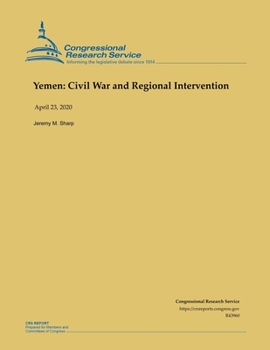Yemen: Civil War and Regional Intervention
This report provides information on the ongoing crisis in Yemen. In 2014, the northern Yemenibased Ansar Allah/Houthi movement (referred to in this report as "the Houthis") took over the capital, Sanaa (also commonly spelled Sana'a), and in early 2015, advanced southward from the capital to Aden on the Arabian Sea. In March 2015, after Yemeni President Abdu Rabbu Mansour Hadi, who had fled to Saudi Arabia, appealed for international intervention, Saudi Arabia and a hastily assembled international coalition (referred to in this report as "the Saudi-led coalition") launched a military offensive aimed at restoring Hadi's rule and evicting Houthi fighters from the capital and other major cities. Since then, the conflict in Yemen has killed tens of thousands, caused significant humanitarian suffering, and has significantly damaged the country's infrastructure. One U.S.- and European-funded organization, the Armed Conflict Location & Event Data Project (ACLED), estimated in October 2019 that more than 100,000 Yemenis have been killed since 2015. Despite multiple attempts by the United Nations (U.N.) to broker a cease-fire that would lead to a comprehensive settlement of the conflict, the parties themselves continue to hinder diplomatic progress. In December 2018, the Special Envoy of the U.N. Secretary-General for Yemen, Martin Griffiths, brokered a cease-fire, known as the Stockholm Agreement, centered on the besieged Red Sea port city of Hudaydah. Over a year later, the agreement remains unfulfilled and, though fighting around Hudaydah has subsided, other fronts have intensified. Parallel initiatives to secure the western city of Taiz and exchange prisoners also remain to be implemented. Although media coverage of the 2015 Saudi-led intervention tended to focus on the binary nature of the war (the Saudi-led coalition versus the Houthis), there actually have been a multitude of combatants whose alliances and loyalties have been somewhat fluid. In summer 2019 in southern Yemen, long-simmering tensions between the internationally recognized Republic of Yemen government (ROYG) and the separatist Southern Transitional Council (STC) boiled over, leading to open warfare between the local allies of Saudi Arabia and the United Arab Emirates. Many foreign observers have denounced human rights violations that they charge have been committed by all parties to the conflict. In the United States and some European countries, there has been vociferous opposition to coalition air strikes that hit civilian targets. Congress has debated and enacted some legislation to limit U.S. support for the coalition, while some Members have highlighted Iran's support for the Houthis as a major factor in Yemen's destabilization. The Trump Administration opposes congressional efforts to restrain U.S. support for Saudi Arabia and the United Arab Emirates and continues to call for a comprehensive settlement to the conflict in line with relevant U.N. Security Council resolutions and other international initiatives. For several years, Yemen has been considered the worst humanitarian crisis in the world, and public health experts warn that the COVID-19 pandemic may have significant negative effects on Yemen's vulnerable population. Half of the country's medical facilities are either closed or partially functioning due to damage from the war, neglect, or lack of basic infrastructure such as running water and electricity. In war-torn Taiz, Yemen's third largest city, all hospitals combined possess four ventilators. Nationwide, Yemen has several hundred ventilators to serve a population of 30 million. Since 2015, the United States has provided over $2.4 billion in emergency humanitarian aid for Yemen.
Format:Paperback
Language:English
ISBN:B088N3YC17
ISBN13:9798643891970
Release Date:January 1
Publisher:Independently Published
Length:24 Pages
Weight:0.18 lbs.
Dimensions:0.1" x 8.5" x 11.0"
Customer Reviews
0 rating





